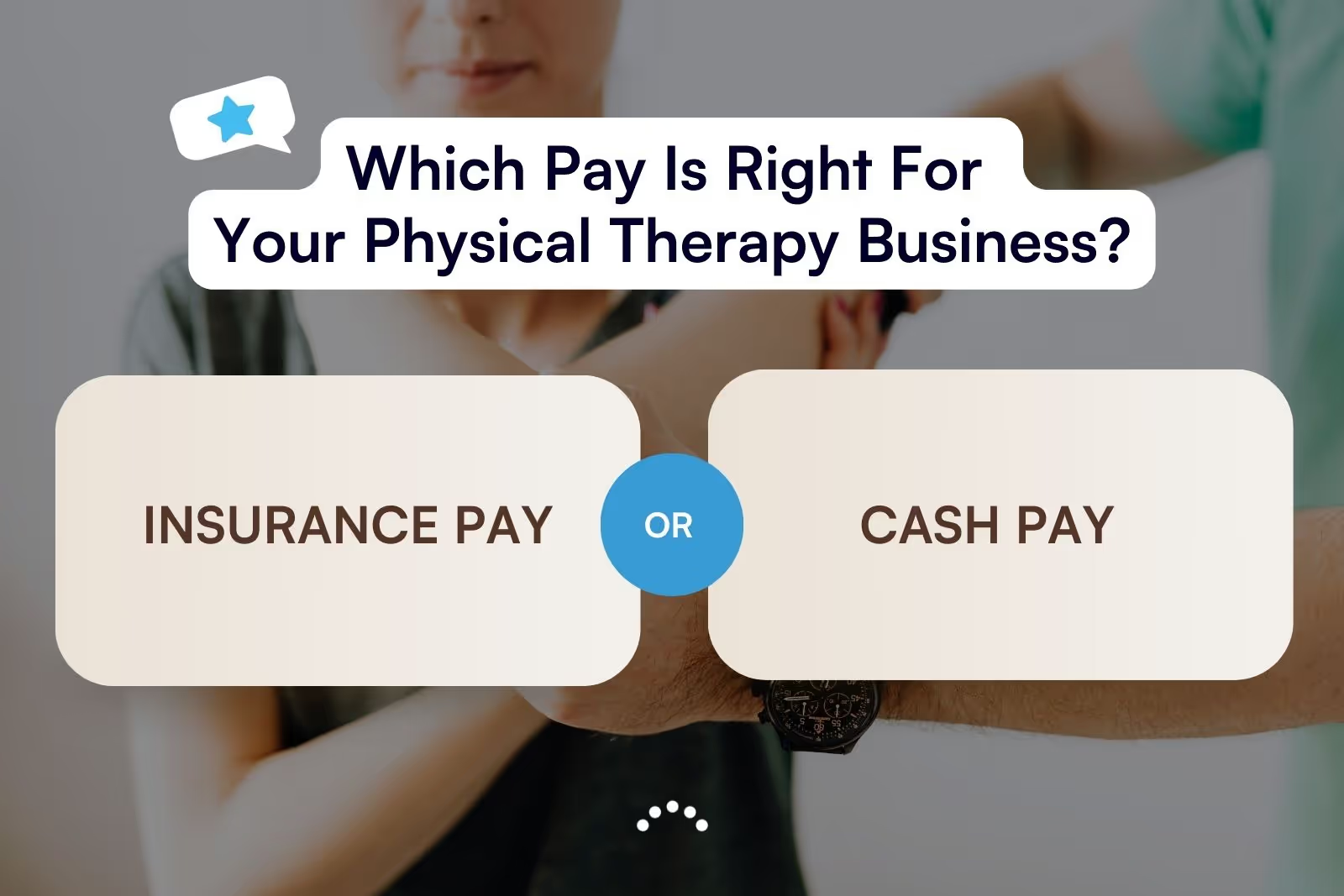Physical Therapy Business Tips
December 15, 2025

Have you been apprehensive about starting your own physical therapy business? You aren't alone. Opening an outpatient clinic is a big undertaking; and finding someone to guide you can be challenging because only some physical therapists do decide to branch out on their own.
In fact, only 3% of physical therapists are self-employed, according to the US Bureau of Labor Statistics, but don't worry; it can be done!
TL;DR: This article walks you through everything you need to start a physical therapy business, from choosing your practice model and securing funding to handling legal setup, hiring, equipment, marketing, and daily operations, so you can open your clinic confidently and deliver high-quality care from day one.
Starting your own physical therapy business is a lot of work. Here are 15 essential steps to opening your own clinic and running it successfully.
You have a lot of options when it comes to starting your own physical therapy business. Think through each one to determine which is the best scenario for you. Here are some options that may be available to you.
Do market research. Base your decisions on facts, not assumptions. The area you live in has a unique culture, competitors, economy, and residents with specific needs. Educate yourself on all of that before making any concrete plans. The SBA has a useful guide for conducting market research.
Choosing a speciality makes your business stand out and makes marketing your physical therapy practice easier. It would help if you based your chosen niche of the following criteria:
Many patients expect their insurance to cover the cost of physical therapy. Physical therapists can enter into contracts with major insurance companies to become part of their network. However, the cost of insurance billing and reduced reimbursement rates can sometimes outweigh the benefits. That's why many physical therapists are turning toward cash-based or out-of-network businesses.
Consider the pros and cons of each option carefully. Zac Cupples, PT and NBA therapist, created an excellent comparison guide for cash pay vs insurance pay.

There's a lot of risk involved in starting a physical therapy business. Understanding what your liabilities are and how to mitigate risk is vital. Here are some legal liabilities physical therapists need to research before opening their own practice.
Think through the building, development, and future of your physical therapy business. Create a business plan by setting SMART goals and benchmarks for reaching those goals. Plan out how you'll get from here to there, in detail. Include financial projections, marketing strategies, operations guides, and staffing details.
You're going to need a team of advisors. Hire professionals to handle the parts of business you're not qualified to do yourself. At a minimum, you need an attorney to draft legal documents, and a CPA to advise you on financial matters.
If you need capital for your start-up, determine how much money you need to open and operate your business. Try to keep your expenses as low as possible, but realistic. You're lender will need the following items to determine if you're eligible for a loan:
Find the right space for your clinic. The size, cost, and location of your building all matter. Decide if you want to buy a building or lease an office space. Here are some things to consider when searching for the right space for your business:
Initial start-up costs for your physical therapy business are significantly impacted by the cost of purchasing equipment. Be budget conscious and choose quality products when deciding what PT equipment, office supplies, and marketing materials are essential.
Think of your website as a virtual storefront. After you set up your physical space, set up your virtual space. Your website will be the place where your future patients meet you for the first time. Make a good impression. Create a website that looks professional, showcases the results you provide, and highlights your skills.
12. Create A Marketing Plan
"If you build it, they will come" is not sound business advice. In order to get more patients, you have to market to a large audience. It's up to you to spread the word about your grand opening. It doesn't stop there. Marketing is an ongoing part of running a business. Create a plan to market your business and become known as the best in your community.
Here are some marketing strategies to include in your plan:
.avif)
Practice management software will make your life and your staff's easier. Choose software that can automate the bulk of your admin tasks. Look for something that can handle scheduling, billing, SOAP notes, intake forms, and marketing. There's a wide variety of software to choose from. Find something that fits the needs of your practice and fits your budget.
Create a system for executing every task in your business. After that, hire and train your new staff.
Consult your attorney and accountant before scheduling interviews to ensure you have the appropriate paperwork for new hires. Create a list of required skills and experience for the open position. Then, create a list of desired traits that aren't necessarily a requirement. Use those lists to select the right candidate.
Getting people in the door is only the first step to a successful physical therapy business. Getting them to come back and refer others to you is equally important. It's essential to uphold high standards and deliver the same quality care every single visit.
Getting people in the door is only the first step to a successful physical therapy business.
The cost of starting a physical therapy business varies greatly depending on size, location, necessary equipment, marketing, etc. Start-up costs can range between $10,000 to $100,000 or more. Estimate your start-up cost by adding up everything that needs to be purchased before you're able to open.
Start-up costs include things like equipment, down payments, security deposits, legal fees, and initial marketing. Create a detailed list of necessary start-up purchases in your business plan. Monthly operating expenses, like rent, utilities, and salaries, are not considered start-up costs.
When you're just starting out, be mindful of your budget. Physical therapy software can automate tasks you'd otherwise pay a person to do. ClinicSense is affordable software for physical therapists with the functionality to replace the need for a receptionist and marketing team. It also increases PT productivity.
Running a successful physical therapy business requires having systems in place. You need a system for scheduling, SOAP Notes, invoicing, organizing client files, and marketing. Practice management software can streamline those systems and automate many tasks. If you have questions about managing all the paperwork, this software can teach you a lot about how to start a physical therapy business and manage it well. Download our free physical therapy SOAP notes template today!


.avif)




Start-up costs can look a little different for every clinic, but most new practices should budget for things like leasing a space, equipment, licensing, insurance, software, and marketing. Your total investment depends on your location and the size of your practice, but planning ahead makes it easier to stay on track financially.

Starting a PT business is a step-by-step process. You’ll choose your practice model, define your niche, create a business plan, secure funding, complete your legal setup, find a location, purchase equipment, and build out your operations and marketing. With a clear plan, you can move through each phase confidently and set your clinic up for success.

Opening a practice takes some time and organization, but it’s absolutely doable. The key is breaking the process into manageable steps—like legal setup, budgeting, operations, and marketing—so you’re never overwhelmed. Many therapists find that the freedom and flexibility of running their own clinic make the effort well worth it.

There are several ways to structure a PT business. Some providers run solo practices, while others build group clinics, mobile or in-home services, or specialty-focused practices. You can also choose between insurance-based or cash-based models. The right fit depends on your goals, ideal clients, and how you want to deliver care.




For 14 days